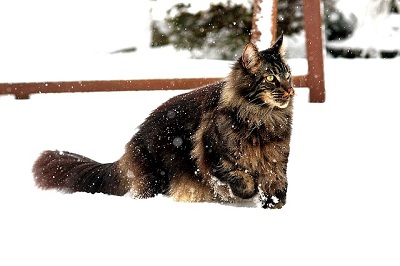Hypothermia in Cats
Hypothermia in Cats
Hypothermia in cats is a rare issue, especially for indoor cats. However, if it affects a cat, it can be fatal. According to veterinarians, the reason for this outcome lies in the fact that many cat owners fail to recognize the symptoms of hypothermia. Cats, who have experienced it, get lower temperature than normal (everything bellows 100 F). They also can experience difficulties with breathing, their heart rate becomes slow, and they appear sleepy. Thus, an affected cat becomes unable to raise the temperature on her own. Without the outside help, the animal experience shortage of breath, a problem with arrhythmia, and finally fall into a coma. Therefore, feline experts think that well-educated cat owners will be able to notice the symptoms on time and act accordingly. They also recommend not to allow a cat to roam throughout the night, especially during winter months. Cats, who are left without human supervision during winter can easily get hypothermia. Many people think that cats are safe in winter because they have fur. But, it is far from the truth. Cats, who become wet and stay too long in a cold temperature can easily get hypothermia. Furthermore, many cats are exposed to the risk of this condition. Namely, little kittens, small cats, cats who went through surgical intervention, or the ones who get anesthesia, as well as senior cats, are more prone to hypothermia. To find out more about hypothermia in cats, the article “Hypothermia in Cats: Symptoms and What to Do “ gives us a few tips about what we can do to help a cat with this health condition
Hypothermia in Cats
Remove your pet from the cold and put him in a warm room.
Dry off your pet thoroughly either with towels or a hair dryer set on low and held about 12 inches away.
Wrap your pet in a blanket (warm it in the clothes dryer first)
Wrap warm hot-water bottles in towels (to prevent burning your pet) and place on pet’s abdomen.
Check the pet’s temperature with a rectal thermometer. If it’s below 95 degrees, the pet could be at risk for hypothermia. Take your pet to a veterinarian immediately.
Cats with hypothyroidism and cats who have a disease of the hypothalamus are also at the huge risk of hypothermia. The best way to prevent a cat from getting it is to keep a cat indoors, at least in winter. Or, if a cat is outdoors, the best way to keep her safe is to limit her time away from home.










